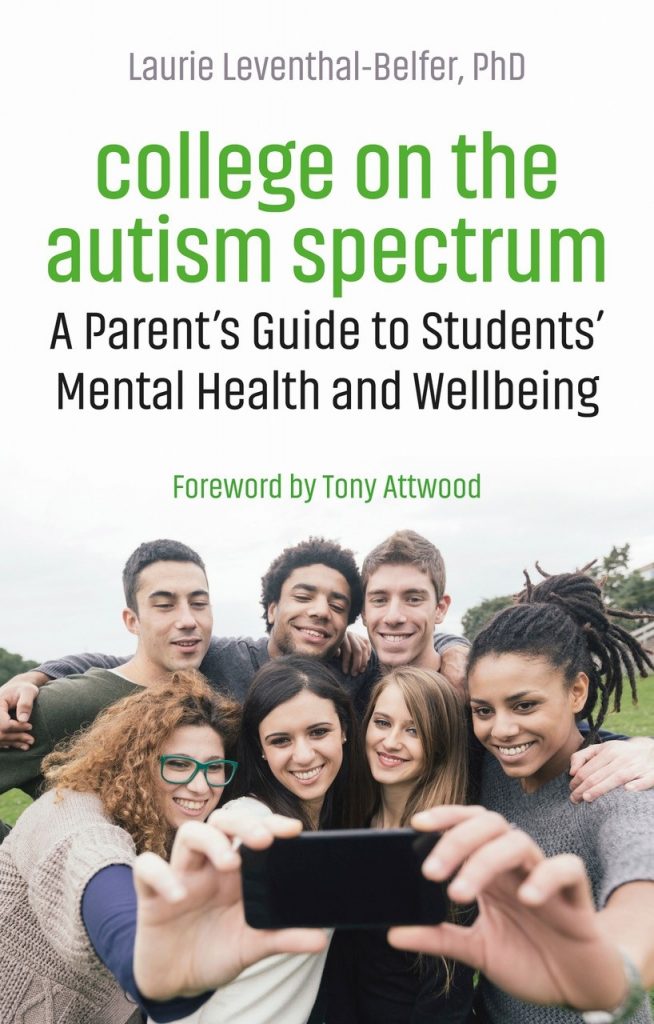College on the Autism Spectrum author Laurie Leventhal-Belfer provides advice to parents and teenagers looking at the college process, whether attending tours or preparing for fall on a new campus.

Can you briefly outline your history working with children in The Friends Program and young adults on the Spectrum and their families?
I have been working with kids on the Spectrum for almost 29 years. I got my start during my post-doctoral at The Children’s Health Council in Palo Alto, where I directed a study of what were thought to be ADHD children who were disruptive at their childcare facilities.
With my background in child development, I was, and still am, an advocate for observing children in their natural settings. So, I developed an evaluation with parent intake interviews, child assessments, observations of parent-child interaction, and a structured playgroup. In these evaluations, it became clear that most of the children had not developed age-appropriate social and communication skills, and their emotional development was not at the same level as their peers. These kids were unique in how adult-like many of them behaved in 1:1 interactions with an adult, but when engaging with them as a teacher or peer, these same children had frequent outbursts.
At that same time, colleagues from Yale and Cambridge had “rediscovered” the diagnosis of Asperger’s Syndrome. A description of these children is in the first book I published for Jessica Kingsley with my colleague, Cassandra Coe: Asperger’s Syndrome in Young Children. A Developmental Guide for Parents and Professionals.
My work with adults began when parents who participated in The Friends Program began calling about concerns for their teens’ transition to college. At the same time, colleagues who knew of my work began to refer their adult clients. I have also consulted with mental health staff at universities that had students they believed were on the Spectrum, and had no curriculum or guidelines for supporting these students’ needs.
What was your inspiration behind writing College on the Autism Spectrum?
The kids who participated in my Friends Program started entering college, and I began to hear from their parents who were looking for guidance. I was also getting referrals from therapists who were seeing young adults who “crashed” in college, had been initially diagnosed as having ADHD or Anxiety Disorders, but actually had Autism Spectrum Disorder.
Their stories of kids crashing their freshman year, concerns of self-harm, depression, problems making friends, inability to find support services at college, and lack of access to information, prompted me to address the challenges of the older adolescents. College on the Autism Spectrum provides parents of children on the Spectrum with a guide to the college experience, including how to set up a good support network, find the right university, and access resources to help their child’s mental health and social wellbeing.
What can parents of autistic young adults learn from reading your book?
Parents will learn about preparing students for the transition to college, how to select a college, managing daily life and academics, and the social-emotional skills that students need if they are to thrive living independently at college. The book also talks about the skills parents need if they are going to foster their teen’s independent living skills. Lastly, College on the Autism Spectrum clarifies the types of mental health and disability services most schools offer and the types of services that may be helpful for ASD college students.
Do you have any general advice for parents, teachers, and other adults to help Spectrum kids adjust to the changes COVID has caused?
This is a stressful time for most college students, and even more so for Autism Spectrum students. So, what I tell parents is to acknowledge the stress this is likely causing for your student. Encourage your child to talk, write, or find another way to express his or her frustration.
Empathize with them about how it must feel to miss their favorite activities and try arranging for them to stay in touch with the therapists they saw while at school. If they have a behaviorist, see if they could have weekly check-ins with you and your child.
Remember that children notice when parents are anxious and may respond by becoming more anxious or oppositional. So try not to read, watch, or listen excessively to the often repetitive news about COVID across the world, as this can trigger the same type of activity in the children. Stay with the basics of washing your hands, keeping surfaces clean, and maintaining social distancing.
Most of us do better when our liveshave a sense of structure and predictability, and this is particularly true for kids on the Spectrum. Keep a family calendar of parents’ work schedules, the children’s classes, family meals, and free time for them to connect with their friends. They may also benefit from having a calendar just for their events, but the family calendar helps them view themselves in the broader family context.
Finally, be forgiving of your child and yourself. This is a difficult time for all of us. There will be some tough moments.
What advice do you have for parents and young adults as they prepare for college in today’s uncertain terrain?
For kids who are preparing to start the application process, I recommend parents start with these basics:
- Determine what your child wants. Start by listing what your child wants. For instance, where geographically would your child like to go to school? Is your child looking for a strong sports department, fraternity, small or large campus, arts programs, same-gender dorms, etc.?
- Assess what your child needs. What does your child need in the way of support? Does he or she currently work with a therapist, have an IEP, or a tutor? This will help you gauge the level of support your child needs to succeed at school.
- Make the list. Start by making a list of colleges that offer both what your child wants and what your child needs. You can ask for help from high school counselors, librarians, the College Board, and the colleges themselves, by emailing or calling. You may even be able to set-up a video tour with the colleges.
- Understand support services. When assessing the best college fit, ask if the college has a program for students on the Spectrum. How well does that program address your individual student’s needs in terms of organization, housing, social support, a mental health team?
- Teach Everyday Skills. For kids who aren’t already doing so, this is a good time to having them manage schedules, homework and project deadlines, communicate directly with their teachers or counselors, plan transportation, and practice managing money. Having these skills in place will make the transition to college much less stressful.
Hear more from Dr. Leventhal-Belfer:
https://www.youtube.com/watch?v=-5w59mMI-4I
